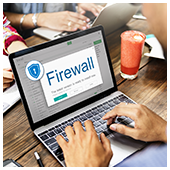
Software firewalls
Calling a piece of software a “firewall” is a bit of an exaggeration. Installing it on a local hard drive is more like locks on a door than impenetrable walls. When data is scanned for threats by a software firewall, the information it contains has already been passed through your router, network switch, and finally your local hard drive.
Once the whole cycle has finished, software firewalls can prohibit risky activities based on blacklisted IP addresses, known malware definitions, and suspicious application requests.
Although these solutions do have value, they can’t guarantee that malware won’t spread to other systems before each packet of data can be scanned, unless they’re standing guard at your business’s gateway to the internet. And whenever the computer with the firewall is powered off, everything it protects is left unguarded.
Hardware firewalls
Because the drawbacks of a software-based firewall are centered around their inefficient network position, a hardware solution is the safer option. Hardware firewalls sit directly behind your router, so every single packet of data coming from the internet must pass through your gatekeeper before landing on any of your internal drives.
Most of these solutions include far more sophisticated controls than just web filtering and basic data scanning. Like most developments in the IT industry, newer hardware firewalls focus on “intelligent” functions that analyze huge datasets to recognize malware and cyberattacks based on irregular activities instead of relying solely on cataloged viruses and attack vectors.
Another benefit of hardware firewalls is that they’re always on. There’s no need to worry about whether the workstation hosting your solution will crash because these devices are built for 24/7 protection. The only downside to this type of solution is the level of monitoring and maintenance it requires. Hardware firewalls are extremely complex and managing them is no easy task.
“Cloud” firewalls
The most recent, and undoubtedly best, solution to network perimeter security are “cloud” firewalls. These are on-site pieces of hardware with software interfaces that can be managed remotely by certified security professionals.
This service model means that experts will monitor your network performance and security for anomalies while your team goes about its business as usual. No need for onsite tweaks and updates -- all of it can be done remotely.
You may hear a lot of experts telling you that the age of on-site hardware has passed and everything can be done in the cloud. Remote administration may be the next wave in network services, but the need for hardware will never go away. If you need someone to manage your physical devices, contact us today.


You must be logged in to post a comment.